Contents
Raspberry Autumn Beauty is a remontant variety that brings a late harvest. Bushes are compact. A proven and reliable variety with a high yield. Disease resistance is average, plants are treated with special preparations from pests.
Characteristic of the variety
Description of the raspberry variety Autumn Beauty:
- remontant variety;
- plant height from 1 to 1,5 m;
- compact or slightly spreading bush;
- shoots of medium thickness;
- a large number of shoots;
- long fruit branches.
According to the description and photo, the berries of the raspberry variety Autumn Beauty have their own characteristics:
- oblong shape;
- ruby color;
- weight 4-6 g;
- large sizes;
- easily removed from the bush;
- sweet taste;
- pronounced aroma.
The raspberry variety Autumn Beauty ripens at the end of August. In warm regions, the first berries are removed from the last decade of July. Peak fruiting occurs in mid-September. The berries ripen at the same time.
The yield of the variety is from 5 to 7 kg of fruits per bush. Often the berries do not have time to ripen on the shoots until the end of the season. In autumn, you can cut branches with unripe fruits and leave them at room conditions for ripening.
Berries varieties have a universal application. They are used fresh, frozen for the winter, processed into jams, jams, compotes. Raspberries do not tolerate transportation well, so it is recommended to use them immediately after harvest.
Planting raspberries
Variety Autumn Beauty is planted on a prepared site, taking into account crop rotation. Culture prefers lighted areas with fertile soil. Seedlings are purchased from nurseries or obtained from a mother bush.
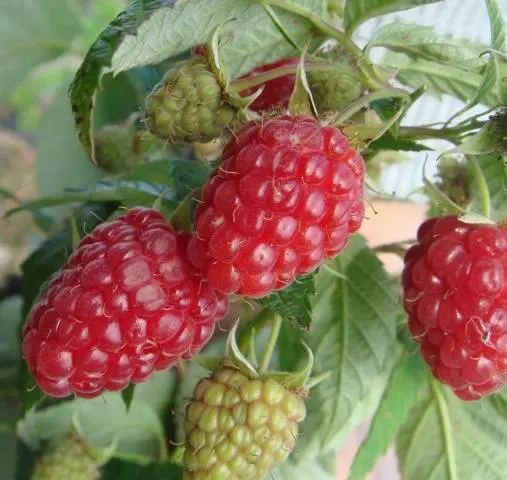
Preparatory stage
Remontant raspberries prefer light, nutrient-rich soils. The permissible level of groundwater is not higher than 1 m. The site should not be subjected to wind loads.
Raspberries are especially demanding on lighting. In the shade, the yield of the variety decreases, the ripening time of the berries is shifted, and their taste worsens.
Raspberries Autumn Beauty are planted in loamy soil. Limestone or dolomite is added to acidic soil. It is preliminary recommended to grow lupins, mustard or other green manure on the site. After potatoes, peppers and tomatoes, planting is not performed.
Planting material is purchased at specialized centers or obtained independently. A healthy seedling with a length of 25 cm and a stem thickness of 5 cm is suitable for planting.
In the presence of a mother bush, you need to choose a root shoot up to 10 cm high. The shoots are dug up and transplanted into a greenhouse. After rooting, the raspberries are ready to be transferred to a permanent place.
Order of work
The planting of the Autumn Beauty variety is started in autumn or spring. The soil is dug up and cleared of weeds. For every sq. m contribute 2 buckets of humus, 1 glass of potassium sulfate and superphosphate.
The sequence of actions when planting raspberries:
- Dig a hole 40×40 cm in size and 50 cm deep. Leave 70 cm between plants. When organizing several rows, keep a distance of 1,5 m.
- Place the root system of a raspberry seedling in a growth stimulant solution for a day.
- Lower the prepared plant into the planting hole and cover with soil. The location of the root collar is at ground level.
- Water the plant generously.
After planting raspberries, keep the soil moist. Plants are watered when the soil begins to dry out. Mulching with peat or humus will help to avoid drying out of the soil.
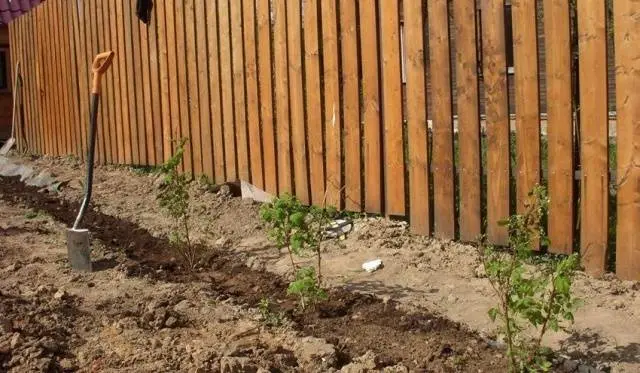
Variety care
According to the description, the raspberry variety Autumn Beauty refers to remontant, therefore, it needs constant care. High yields are provided by regular watering, top dressing and pruning of shoots. To protect against diseases and pests, folk remedies or biological products are used.
The grade is steady against frosts, well transfers winter under a snow cover. In the absence of snow, raspberries need shelter with humus and spruce branches.
Watering
Raspberries are watered weekly, in drought – up to 3 times a week. With a lack of moisture, the plants begin to dry out, and the number of ovaries decreases.
Stagnation of moisture is also detrimental to raspberries. With excessive moisture, the roots do not get access to oxygen, the development of plants slows down, signs of diseases begin to appear.
When watering, the soil should get wet to a depth of 30 cm. Moisture is especially important for plants during flowering and fruiting. For extensive plantings, drip irrigation is equipped to ensure a uniform supply of moisture. In the fall, the last plentiful watering is performed, helping the raspberries survive the winter.
Feeding
When fertilizing during soil preparation, Autumn Beauty raspberries begin to be fed only 3 years after planting. In the future, fertilizers are used annually.
Before flowering, raspberries are fed with mullein infusion in a ratio of 1:10. Fertilizer saturates plants with nitrogen and promotes the development of new shoots. During the growing season, nitrogen components are abandoned in favor of potassium and phosphorus.
Raspberry feeding options:
- 50 g of nitroammophoska per 1 sq. m.;
- 30 g of superphosphate and 15 g of potassium sulfate;
- 200 g dry wood ash.
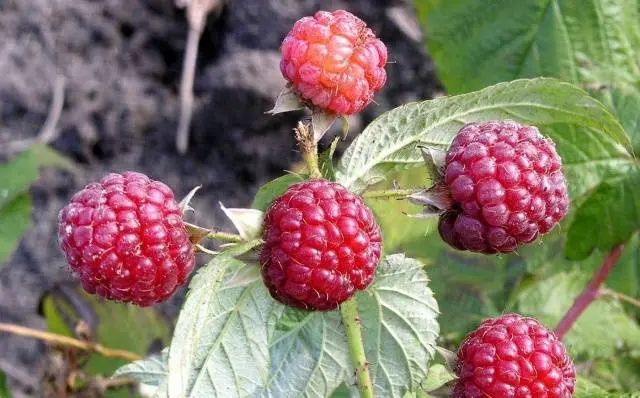
Substances are embedded in the ground or diluted in 10 liters of water. During the season, the Autumn Beauty variety is fed 2-3 times. Between treatments take a break of 2-3 weeks.
In cold weather, watering is replaced by spraying raspberries. The concentration of substances is reduced by 2 times. Foliar processing plants absorb nutrients better.
Trimming
After the end of fruiting, the Autumn Beauty variety is cut out at the root. The following year, raspberries will have new shoots that will bring a high yield.
If autumn pruning is not carried out, then in the spring it is necessary to eliminate dry and frozen shoots. The top of the bush is left, if you shorten it, then the development of raspberries will slow down. There is a dried up part of the shoot, then it is cut to a healthy kidney.
In summer, root shoots are eliminated, which can be used to propagate the variety. For 1 sq. m leave no more than 10 shoots.
Diseases and pests
Remontant raspberries are characterized by increased resistance to diseases. At high humidity, signs of fungal infections may appear on plants: anthracnose, verticillium, spotting.
Topaz, Oksiom or Fitosporin are used to fight diseases. Preventive treatments are carried out during the flowering period of raspberries. Disinfecting garden tools, rationing watering, and weeding will help protect plantings from diseases.
Raspberry pests are mites, beetles, caterpillars, aphids. For insect control, folk remedies are effective, which have no restrictions on use. For 10 liters of water, take 100 g of chopped garlic or onion. The agent is insisted for 2 days, after which the raspberry plantings are sprayed.
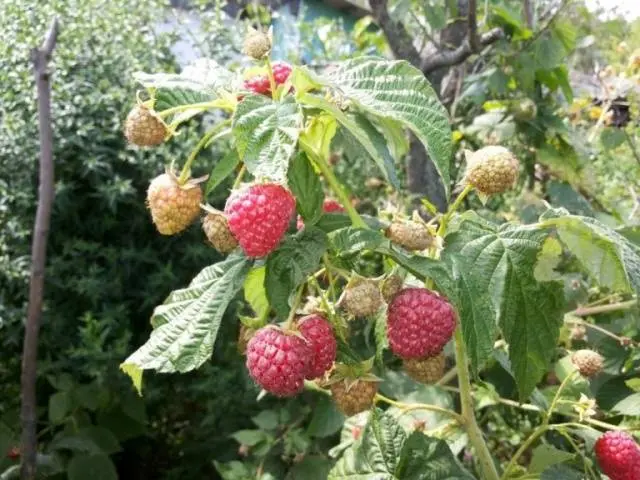
Wood ash is a universal pest control method. It is sprayed onto plants or added to a spray. Tobacco dust has similar properties.
Special preparations are recommended to be used before the raspberries begin to bloom. Actofit, Iskra, Karbofos are used against insects.
Reviews of gardeners
Conclusion
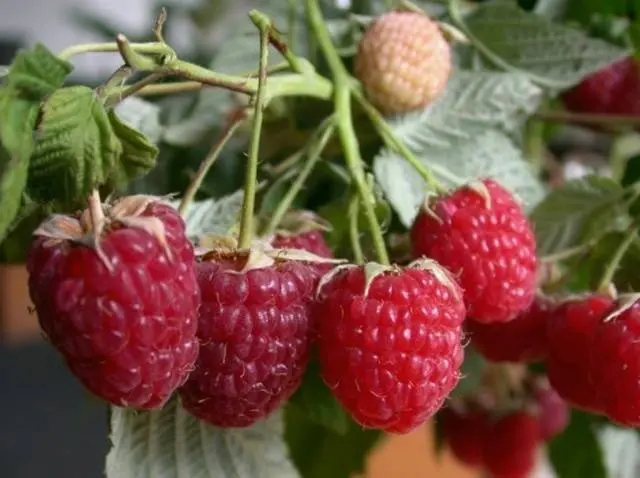
Raspberry Autumn beauty is notable for its long and abundant fruiting. Harvest time depends on weather conditions. Raspberries are planted in well-lit areas with fertile soil. The variety requires careful care, including watering, nutrient application and pruning.









